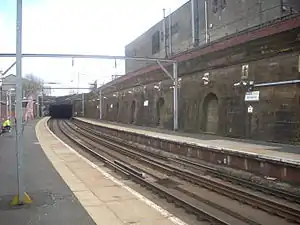Bridgeton railway station
Bridgeton railway station serves the Bridgeton district of Glasgow, Scotland and is a station on the Argyle Line, 1+3⁄4 miles (2.8 km) south east of Glasgow Central. The station is operated by ScotRail who also provide all train services.
 Bridgeton station, looking south east towards Dalmarnock | |
| General information | |
| Location | Bridgeton, Glasgow Scotland |
| Coordinates | 55.8484°N 4.2250°W |
| Grid reference | NS607639 |
| Managed by | ScotRail |
| Transit authority | SPT |
| Platforms | 2 |
| Other information | |
| Station code | BDG |
| Key dates | |
| 1 November 1895 | Opened |
| 5 October 1964 | Closed |
| 5 November 1979 | Re-opened |
| Passengers | |
| 2017/18 | |
| 2018/19 | |
| 2019/20 | |
| 2020/21 | |
| 2021/22 | |
| Notes | |
Passenger statistics from the Office of Rail and Road | |
History
Called Bridgeton Cross Station,[2] it opened on 1 November 1895 when the line between Glasgow Green and Rutherglen was opened by the Glasgow Central Railway. The station became a junction with the opening of the line to Carmyle and Kirkhill on 1 February 1897. Westbound services ran to Stobcross, from where they could proceed to Possil via Maryhill Central, Partickhill and points north via the connection to the Stobcross Railway or on to the Lanarkshire and Dunbartonshire Railway to Dumbarton and Balloch Central via Partick Central & Dalmuir Riverside.
In 1956 the line was re-signalled with colour light signals controlled from the re-equipped signal boxes at Bridgeton Cross Junction and Stobcross Junction. However, the station was closed along with both lines on 5 October 1964 as a result of the Beeching Axe. The tracks were subsequently lifted, but the station and tunnels were left intact.
As part of the Argyle Line project, the Rutherglen line platforms reopened as Bridgeton Station[3] on 5 November 1979, as offering regular commuter services into Central Station (low level) and on towards the western suburbs.
In preparation for the 2014 Commonwealth Games, the station underwent substantial renovations in 2010.[4]
Accidents and incidents
- On 2 February 1929, a passenger train was diverted into the bay platform due to a signalman's error. Several people were injured when the train crashed through the buffers.[5]
Services
1979
When the Argyle Line was opened in 1979, there were six trains an hour to the Hamilton Circle, from Dalmuir, with two services an hour going as far west as Dumbarton Central. The hourly service between Lanark and Milngavie ran non-stop through Bridgeton station.
2008
Four trains per hour daily head westbound towards Glasgow Central and beyond (Milngavie and Dalmuir) and eastbound towards Motherwell (with services onward to Lanark).
2015
The basic four trains per hour frequency remains unchanged, but since the December 2014 timetable recast southbound trains now run to either Motherwell via Hamilton Central or via Whifflet (though alternate services on that route terminate at Whifflet). On Sundays, southbound trains also serve Larkhall every hour and Balloch every 30 minutes.[6]

Routes
| Preceding station | Following station | |||
|---|---|---|---|---|
| Dalmarnock | ScotRail Argyle Line |
Argyle Street | ||
| Historical railways | ||||
| Parkhead Line and station closed |
Caledonian Railway Glasgow Central Railway |
Glasgow Green Line open; station closed | ||
| Dalmarnock | ||||
References
- Brailsford, Martyn, ed. (December 2017) [1987]. "Gaelic/English Station Index". Railway Track Diagrams 1: Scotland & Isle of Man (6th ed.). Frome: Trackmaps. ISBN 978-0-9549866-9-8.
- "Glasgow map, 1895–96". www.maps.nls.uk. to "Glasgow map, 1947". www.maps.nls.uk.
- "Bridgeton Railway Station". www.geograph.org.uk.
- "Bridgeton Cross Improvements, July 2010" (PDF). www.clydegateway.com.
- Earnshaw, Alan (1989). Trains in Trouble: Vol. 5. Penryn: Atlantic Books. p. 23. ISBN 0-906899-35-4.
- Table 225 National Rail timetable, May 2016
- Sources
- Butt, R. V. J. (October 1995). The Directory of Railway Stations: details every public and private passenger station, halt, platform and stopping place, past and present (1st ed.). Sparkford: Patrick Stephens Ltd. ISBN 978-1-85260-508-7. OCLC 60251199. OL 11956311M.
- Jowett, Alan (March 1989). Jowett's Railway Atlas of Great Britain and Ireland: From Pre-Grouping to the Present Day (1st ed.). Sparkford: Patrick Stephens Ltd. ISBN 978-1-85260-086-0. OCLC 22311137.